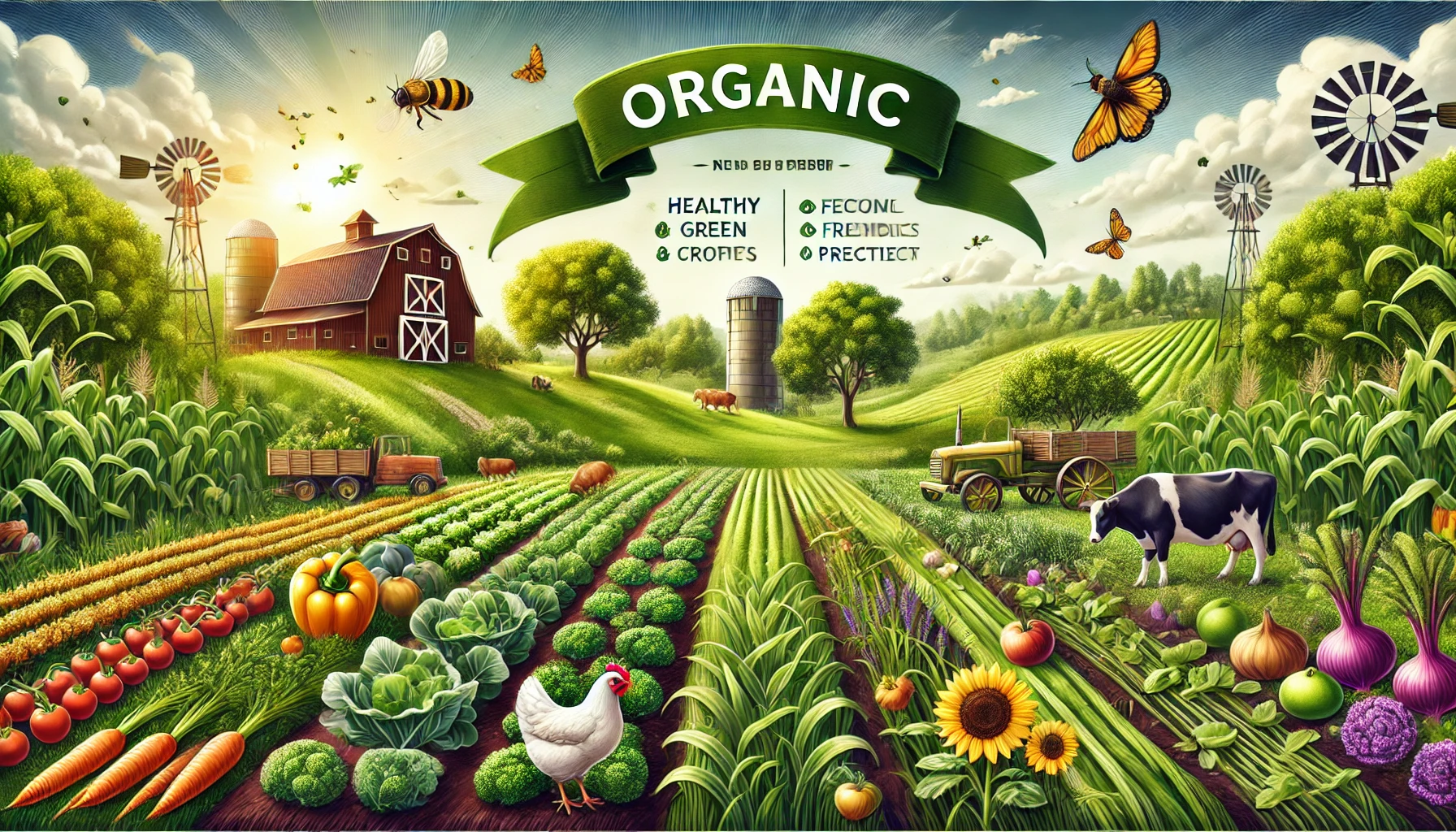Organic Farming: A Beginner's Guide to Getting Started
Organic Farming: A Beginner's Guide to Getting Started
With increasing consumer demand for healthy, chemical-free food, organic farming is becoming an attractive option for many farmers. If you’re thinking about transitioning to or starting an organic farm, this guide will walk you through the key steps and considerations to help you succeed.
1. Understanding Organic Farming
Organic farming is based on a set of principles that prioritize soil health, biodiversity, and natural processes. Organic farmers avoid using synthetic chemicals such as fertilizers, pesticides, or genetically modified organisms (GMOs). Instead, they rely on techniques like composting, crop rotation, and biological pest control to maintain farm productivity and sustainability.The benefits of organic farming include:
Healthier soil through natural nutrient cycling
Improved biodiversity, attracting beneficial insects and organisms
Reduced environmental impact, minimizing pollution and chemical runoff
Increased market demand for organic products
2. Choosing the Right Land
Location is a critical factor when starting an organic farm. Consider:
Soil quality: Look for land with healthy, nutrient-rich soil that has good drainage and structure. Conduct a soil test to evaluate its pH levels, nutrient content, and organic matter.
Climate: Choose crops that thrive in your region’s climate. Factors such as temperature, rainfall, and growing season length should guide your crop choices.
Water access: Ensure your farm has a reliable water source for irrigation.
If the land you choose was previously used for conventional farming, it may require a transition period to rebuild soil health and meet organic certification standards.
3. Getting Certified as Organic
To market your produce as organic, you’ll need to obtain organic certification from a recognized body, in your country.
Certification typically involves:
A transition period: Your land must be free of prohibited chemicals for three years before it can be certified as organic.
An organic system plan (OSP): This is a detailed description of how your farm complies with organic standards, including your farming practices, input use, and soil management.
Regular inspections: Certifying agents will inspect your farm to ensure you meet the necessary requirements.
While the certification process can be time-consuming, it opens up access to premium markets where consumers are willing to pay more for organic products.
4. Building Healthy Soil
The foundation of a successful organic farm lies in the soil. Without synthetic fertilizers, organic farmers need to adopt natural soil enrichment practices to maintain fertility and boost yields. Key strategies include:
- Composting: Regularly adding compost improves soil structure, increases water retention, and provides essential nutrients to crops.
- Cover cropping: Planting cover crops like legumes, rye, or clover during off-seasons helps prevent erosion, suppress weeds, and add organic matter to the soil.
- Crop rotation: Rotating crops helps prevent nutrient depletion and disrupts pest and disease cycles.
Healthy soil is key to maintaining high yields in organic farming, so prioritize soil-building practices in your farm management plan.
5. Pest and Weed Management
One of the biggest challenges for organic farmers is managing pests and weeds without synthetic chemicals. Luckily, there are several natural alternatives:
- Biological control: Introducing beneficial insects like ladybugs or predatory wasps can help control pests naturally.
- Companion planting: Some plants naturally repel pests or attract beneficial insects. For example, planting marigolds around your garden can deter harmful nematodes and attract pollinators.
- Natural pesticides: Organic-approved pesticides, such as neem oil or insecticidal soap, can be used to control infestations. However, they should be applied as a last resort and sparingly to avoid harming beneficial organisms.
- Mulching and hand weeding: Organic farmers often use mulch to suppress weeds, as well as manual weeding practices.
6. Diversifying Your Farm
Successful organic farms often diversify their operations to spread risk and increase profitability.Consider:
- Growing a variety of crops: Diversified planting can help maintain soil health and reduce the risk of total crop failure due to pests or disease.
- Raising organic livestock: If you have the space, raising livestock such as chickens, cows, or goats organically can complement your crop production. Animal manure can be composted and used to enrich your soil.
- Adding value to your products: Processing your farm products into organic jams, sauces, or cheeses can increase their value and attract more customers.
7. Marketing Your Organic Products
One of the most exciting aspects of organic farming is the growing demand for organic produce. Consumers are increasingly seeking out organic products due to their perceived health benefits and lower environmental impact. To tap into this market,consider these marketing strategies:
- Farmer’s markets: Selling directly to consumers at local farmer’s markets allows you to build relationships and explain the benefits of your organic produce.
- Community Supported Agriculture (CSA): A CSA program allows customers to purchase a share of your harvest in advance, giving you a steady income and creating loyal customers.
- Organic certifications and labels: Display your organic certification prominently on your packaging and marketing materials to build trust with consumers.
Conclusion:
Starting Your Organic FarmTransitioning to organic farming is a rewarding journey that requires commitment, knowledge, and patience. By focusing on healthy soil, natural pest management, and diversifying your farm, you’ll be well on your way to creating a thriving organic business.
As the demand for organic products continues to grow, now is a great time to start your own organic farm. With the right strategies and mindset, you can produce healthy, sustainable food while tapping into a market that values quality and environmental responsibility.
Have any suggestions or questions please use the comment section thanks 🤗🤗🥰🥰


Comments
Post a Comment